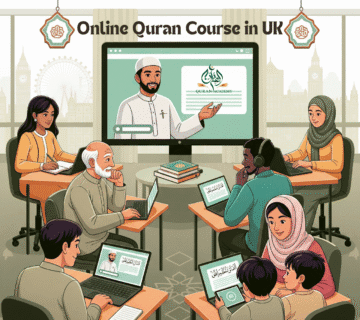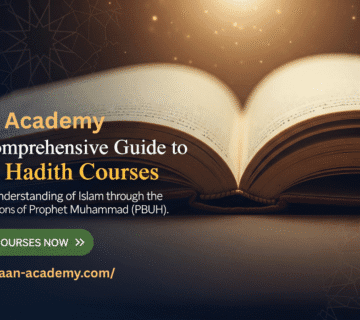Quran Academy offering the Best Islamic Studies Courses designed to enrich your mind and elevate your soul. Our programs go beyond mere recitation, diving deep into the profound wisdom of the Holy Quran, the authentic teachings of the Sunnah, and the rich heritage of Islamic jurisprudence (Fiqh). Whether you’re a beginner seeking to understand the fundamentals of Aqeedah (Islamic Creed) or an advanced student eager to master Tajweed and Tafsir, our experienced male and female scholars provide expert guidance. We combine traditional teaching methodologies with modern, interactive approaches, ensuring a clear, accessible, and deeply spiritual learning experience that truly sets us apart as a leader in Islamic education.
here are some of the highly-regarded types of Islamic Studies courses
I. Core Areas of Islamic Studies:
The best courses will typically cover these foundational subjects:
-
Quranic Studies:
- Tajweed: Proper pronunciation and rules of reciting the Quran. Essential for everyone.
- Hifz: Memorization of the Quran.
- Tafsir: Exegesis and interpretation of the Quran, understanding its meanings, context, and lessons.
-
Hadith Studies:
- Understanding the sayings, actions, and approvals of Prophet Muhammad (PBUH).
- Learning about the chains of narration (Isnad) and the methodology of Hadith authentication (Mustalah al-Hadith).
-
Fiqh (Islamic Jurisprudence):
- The understanding and application of Islamic law derived from the Quran and Sunnah.
- Covers rulings related to worship (Ibadaat), personal status (marriage, divorce, inheritance), transactions (Muamalat), and more.
-
Aqeedah (Islamic Creed/Theology):
- The fundamental beliefs of Islam, including belief in Allah, His angels, His books, His messengers, the Day of Judgment, and Divine Decree.
- Understanding the core tenets of faith.
-
Seerah (Prophetic Biography):
- The life story of Prophet Muhammad (PBUH), including his teachings, character, and the events of his time. This provides context for the Quran and Hadith.
-
Arabic Language:
- Crucial for understanding the Quran and Hadith in their original language. Courses often cover grammar (Nahw), morphology (Sarf), and vocabulary.
-
Islamic History:
- Study of the history of Islam, from the time of the Prophet (PBUH) through various Islamic empires and civilizations.
-
Islamic Ethics and Spirituality (Tazkiyah):
- Focuses on developing good character, spiritual purification, and the inner dimensions of faith.
II. Factors to Consider When Choosing:
- Credibility of Scholars/Teachers: Ensure the instructors are qualified, knowledgeable, and adhere to authentic Islamic teachings.
- Curriculum Depth and Breadth: Does the program cover the essential subjects comprehensively, or is it highly specialized?
- Methodology and Pedagogy: Is the teaching style engaging, interactive, and suitable for your learning style?
- Accreditation/Recognition (if seeking a degree): Is the institution recognized if you need a formal qualification?
- Cost: Many excellent resources are free or affordable, while university degrees can be expensive.
- Flexibility (for online learners): Does the program offer live classes, recorded sessions, or self-paced options?
- Language of Instruction: Are the courses available in your preferred language? (Many classical texts are in Arabic, but translations and English-taught courses are widely available).
- Community and Support: Does the program offer opportunities for interaction with teachers and fellow students?
Are you searching for the best courses to deepen your understanding of Islam?
At Quran Academy, we offer you a complete and integrated educational path in Islamic Studies. From Tafsir (interpretation) of the Holy Quran and Tajweed rules, to understanding Hadith Shareef (Prophetic traditions) and the sciences of Fiqh (Islamic jurisprudence), we provide you with the essential tools to strengthen your faith.
Our specialized teachers, with their comprehensive and accessible approach, will make your learning journey enjoyable and fruitful.
What are the benefits of studying Islamic Studies?
Benefits of Studying Islamic Studies
Studying Islamic Studies provides insights into the beliefs, practices, and history of Islam.
It helps individuals develop a better understanding of diverse cultures and promotes tolerance and respect.
By delving into Islamic teachings, one can enhance their knowledge of ethics, morality, and spirituality.
Moreover, it offers opportunities for personal growth and self-reflection, fostering a sense of community and interconnectedness with others.
Understanding Islamic principles can also lead to increased cross-cultural communication skills and a broader perspective on global issues.
Ultimately, immersing oneself in Islamic Studies can promote empathy, critical thinking, and a deeper appreciation for the rich tapestry of humanity’s spiritual traditions.
In summary, studying Islamic Studies enables individuals to gain a comprehensive understanding of Islam, fostering tolerance, personal growth, and global awareness.
How can Islamic Studies contribute to interfaith dialogue?
Islamic Studies play a crucial role in fostering interfaith dialogue by promoting understanding, respect, and cooperation among different religious communities.
By studying Islamic principles, beliefs, and values, individuals can gain insights into the Muslim perspective, thereby breaking down stereotypes and misconceptions.
This knowledge encourages open communication and empathy, creating bridges of mutual understanding.
Through Islamic Studies, individuals also learn about the shared values and commonalities that exist among various faith traditions, leading to increased tolerance and harmony.
Additionally, Islamic teachings emphasize concepts such as peace, justice, and compassion, which are essential for promoting dialogue and collaboration among diverse religious groups.
Overall, Islamic Studies provide a foundation for building relationships, promoting inclusivity, and working towards a more peaceful and unified society.
Are there any online Islamic Studies courses available?
Yes, there are numerous online Islamic Studies courses available today.
These courses cover a wide range of topics within Islamic studies, making them accessible to learners worldwide.
The convenience of online learning allows students to explore the rich history, theology, and culture of Islam from the comfort of their homes.
Additionally, online Islamic Studies courses often provide flexibility in terms of scheduling, making it easier for individuals with busy lifestyles to pursue their academic interests.
These courses offer a unique opportunity to deepen one’s understanding of Islamic principles and practices, regardless of geographical location or time constraints.
Whether you are a beginner seeking an introduction to Islamic Studies or an advanced learner looking to delve deeper into specific topics, online courses can cater to your needs effectively.
What career opportunities are available for Islamic Studies graduates?
Career Opportunities for Islamic Studies Graduates
Islamic Studies graduates have a wide range of career opportunities to explore.
Some potential career paths include:
- Interfaith Coordinator: Facilitating dialogues and understanding between different religious groups.
- Cultural Specialist: Working in museums, cultural centers, or libraries to educate others about Islamic history and culture.
- Humanitarian Aid Worker: Providing assistance to Muslim communities in need around the world.
- Researcher: Conducting academic research on topics related to Islam and Islamic civilizations.
Overall, Islamic Studies graduates can pursue fulfilling careers in education, interfaith dialogue, cultural preservation, humanitarian efforts, and academic research, making a positive impact on society.
What are some famous books in the field of Islamic Studies?
Some famous books in the field of Islamic Studies include:
- “Sahih al-Bukhari” – one of the most trusted collections of sayings and actions of Prophet Muhammad.
- “The Muqaddimah” by Ibn Khaldun – a classic work on early Islamic history and sociology.
- “In the Footsteps of the Prophet” by Tariq Ramadan – a modern exploration of Prophet Muhammad’s life and teachings.
- “Islam: A Short History” by Karen Armstrong – provides an overview of Islamic history and beliefs.
- “The Autobiography of Malcolm X” by Malcolm X and Alex Haley – offers insights into Islam within the context of the Civil Rights Movement.
These books cover a wide range of topics within Islamic Studies, making them essential reads for anyone interested in understanding the religion and its history.
Book Free Trial Class
resource here





No comment